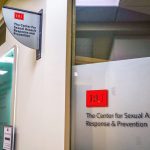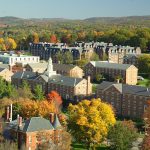
In the wake of President Donald Trump’s new travel ban issued on Sept. 24, Boston University officials said they do not anticipate it will have much of an impact on the university’s community, even though they will continue to assist those who could be affected by the policy.
Jeanne Kelley, managing director of BU’s International Students and Scholars Office, said while the new travel restrictions on foreigners from Chad, Iran, Libya, North Korea, Somalia, Syria, Venezuela and Yemen differ from the administration’s previous travel bans, it should not have a significant effect on the BU community.
“It is different from previous ones, really moving away from a temporary ban to a more permanent process to determine eligibility for visas,” Kelley said. “While the countries banned changed, these restrictions are based on specific categories that do not restrict activities such as visa applications for F-1 [and] J-1 students and scholars. The restrictions do not have a significant effect on our students and scholars.”
Kelley said the ISSO will continue to provide resources such as immigration advice to international students and scholars as well as education on changes to the regulation.
“[We provide] a lot of immigration advice to all our international students and scholars from the stage of admission through the duration of the program until after graduation when they remain on their visa,” Kelley said. “One of our main priorities is to educate them on any changes to regulation, every time they are planning international travel.”
Kelley added that while these restrictions may not have a detrimental effect on BU, the university is still working to mitigate its impact on the school’s international community.
“It doesn’t mean that our community isn’t feeling the effect,” Kelley added. “We will continue to advocate for open travel authorizations.”
Adil Najam, dean of the Frederick S. Pardee School of Global Studies, said the new ban sends the message that the United States is not a welcoming place anymore, despite all that international students contribute to American universities.
“Because we have good universities, they attract the best and the brightest in the world, which gives a great advantage to our own universities, but also gives a great advantage to U.S.-born citizens because then they study with the best,” Najam said. “Especially BU … just stand on Commonwealth Avenue and look at the people passing by you, and you will see how international [of] a place this is.”
Najam also said he is very proud of how BU has responded to this issue.
“If you recall the two statements of the president — one that came out when the first ban came out, one in a letter to the community — he was proud of a university that took this seriously,” Najam said. “The other level I think I’m proud is at level of the community — the students and the faculty, all of us who serve BU.”
Yasmin Younis, a College of Communication senior and president of the Arabic Society of BU, expressed her disagreement with the ban.
“The ban in and of itself is inherently racist and xenophobic,” Younis wrote in an email. “I find it to be extremely counterproductive and problematic because I find that it won’t solve any ‘security’ issues, but will feed into the irrational fear of foreigners or Muslims.”
Younis also stated her discontent with the way BU has responded to many of Trump’s executive orders restricting foreign travel to the United States.
“Honestly, I don’t see the university taking a huge stance,” Younis wrote. “It’s a shame to see that although the administration may make comments condoning the ban and proposed bans, the administration fails to actually take action and protect its own students.”
Several students said they expect the new ban to impact students and faculty members.
Ben Hammer, a College of Arts and Sciences senior, said he thinks it is the university’s responsibility to protect the students who may be affected by the ban.
“You got students who can’t go home during the summer, or they wouldn’t think of going home to wherever they may be from, like Iran,” Hammer said. “[The university] has a lot of money. They could lobby, I suppose. They have a right or they have a responsibility.”
Sultan Alnaqbi, a College of Engineering freshman, said he doesn’t think there is much the university can do to fight a proclamation signed by the country’s president.
“I guess they could spread awareness towards their students, but then again, if it’s something signed by the president, it’s not much the university can probably do about it,” Alnaqbi said. “They can always make petitions or even with freedom of speech they can protest against it.”
Alnaqbi said the travel ban might impact the number of international students enrolled at the university.
“One of the beautiful things about BU is its huge diversity,” Alnaqbi said. “That diversity could definitely decrease with the ban because you’ll have less people from specific countries.”
Anish Guha, a Questrom School of Business senior, said he has friends within the BU community who are feeling the impact of the ban.
“I definitely know a couple of friends who are from the affected countries so, in terms of their plans right now, they are very scared,” Guha said.
He also called on the university to do as much as it can to support students from the banned countries.
“It’s really about working with the legal resources that they have available,” Guha said. “In terms of finding the experts that’ll help students affected, to make sure they understand all their options going forward.”




